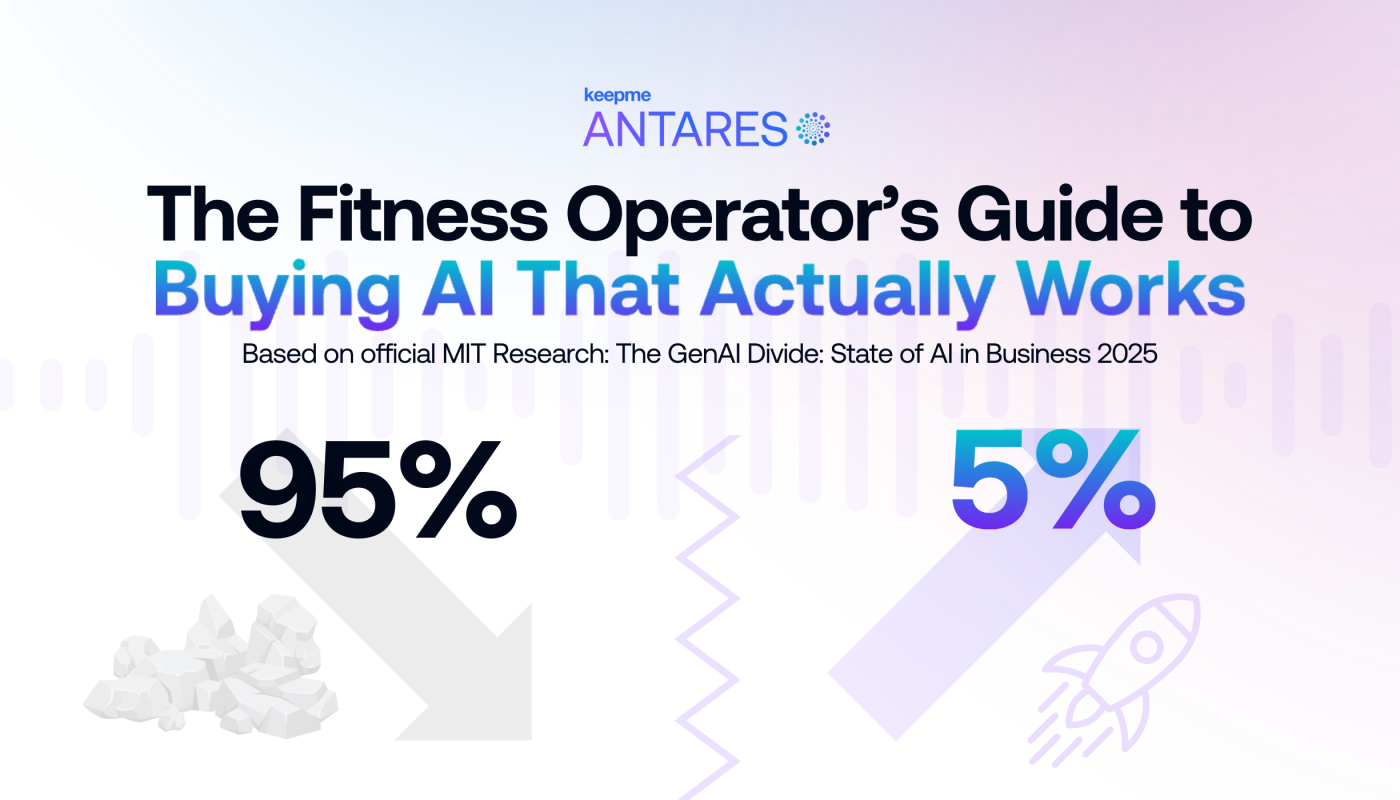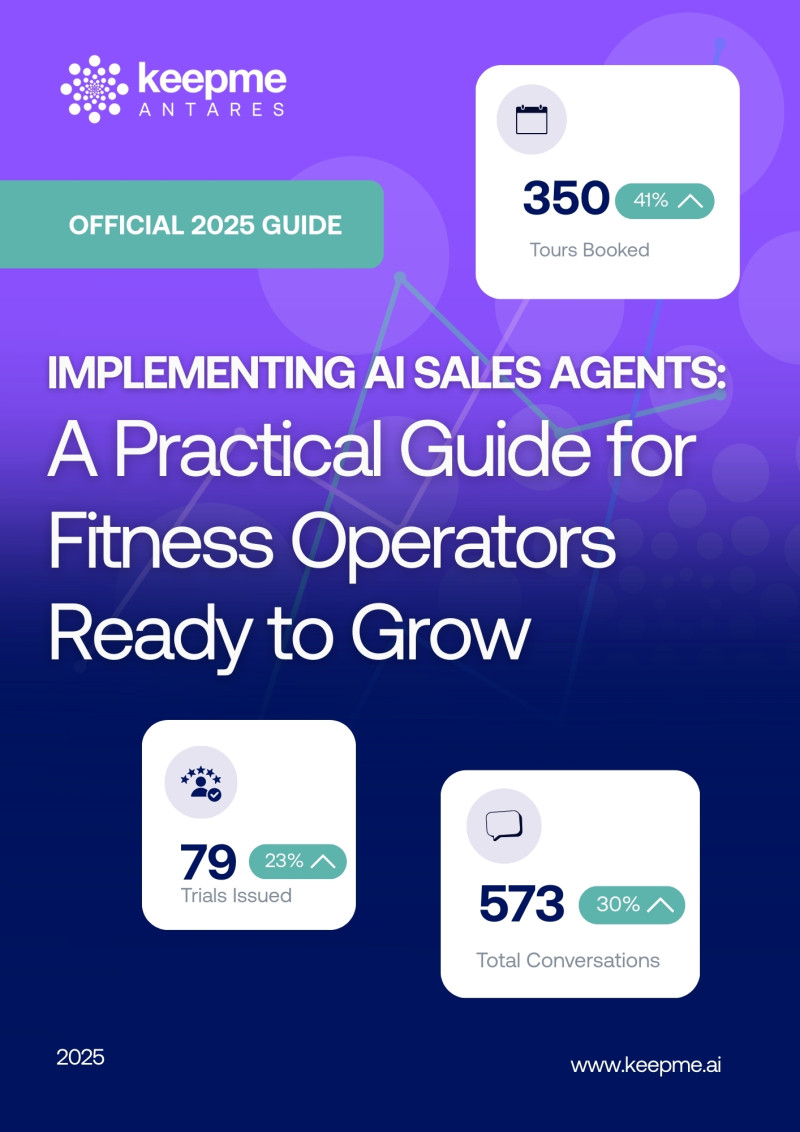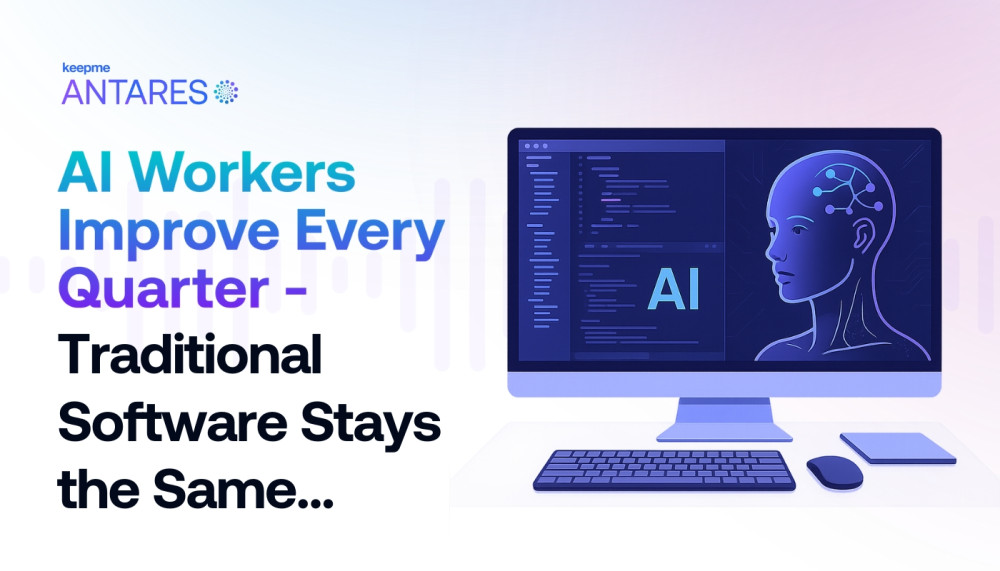The Fitness Operator’s Guide to Buying AI That Actually Works


The latest MIT report, The GenAI Divide: State of AI in Business 2025, makes one thing crystal clear: when you shop for AI, you’re not just shopping for a new tool. You’re making a decision that could reshape your profit and loss.
After studying more than 300 AI projects across industries, MIT found:
95% of AI pilots fail to deliver measurable ROI
Only 5% make it into production and create real business impact
For fitness operators, this finding should be a wake-up call. Because AI done wrong is a distraction - but AI done right changes the economics of your business.
Why 95% Fail
According to MIT, most AI tools stall because they don’t learn, don’t adapt, and don’t fit into daily workflows. They look great in a demo but crumble in practice.
Sound familiar? In fitness, we’ve seen plenty of these:
Chatbots bolted onto websites that can’t answer more than a handful of questions
'AI webchat' solutions that are really just thinly veiled chatbots - with no metrics and results to back up their supposed efficacy. Instead, you get wishy washy claims to have 'saved the teams hours of work' or 'answered fifty questions in 24 hours'...but nothing on how many tours they booked or sales they contributed to. Why? Probably because they don't take any action that can be tied to revenue.
CRM “AI add-ons” that sit idle because staff don’t trust them.
Agencies pitching automation that adds yet another tool into an already overloaded stack - a stack where none of the tools you have were designed to work together.
None of these actually move the needle on member acquisition. They’re part of the 95%.
What the 5% Do Differently
The successful 5% share some clear traits. MIT calls them “agentic AI” systems: tools that learn, adapt, and integrate deeply into workflows. In other words, they get better over time and embed themselves into the way your team actually operates.
The 5% also:
Reach production quickly (mid-market businesses succeed in 90 days vs. 9 months for large enterprises)
Partner with external vendors instead of trying to build AI in-house (success rates are twice as high)
Deliver not just front-office visibility but back-office efficiency - cutting agency costs, replacing outsourced services, and reducing wasted ad spend
Create compounding advantages: once trained on your workflows, they become hard to replace, locking in value over the long term
What This Means for Fitness Operators
MIT’s research is clear: when you buy AI, you’re not just buying software. You’re deciding whether your sales funnel will stay in the 95% that fail, or cross into the 5% that transform their business.
The difference comes down to this: are you choosing a semi-intelligent webchat, or a truly agentic solution?
Static tools - the kind bolted onto websites or buried in CRMs - can answer a few questions, but they don’t learn, don’t remember, and don’t adapt. MIT shows these systems almost never survive beyond pilot stage. They look good in a demo, but they won’t move your P&L.
Agentic AI, on the other hand, improves over time. It integrates across your stack and existing workflows, remembers conversations, adapts to your prospects, and actually drives revenue. These are the systems MIT identified as the 5% that succeed.
For fitness operators, crossing the GenAI Divide means more than plugging in a webchat. It means embedding a sales agent that can:
Continue conversations seamlessly across channels
Book tours and trials automatically
Reschedule cancellations to keep your pipeline full
Turn bookings into paying members, without relying on extra staff or agencies
That isn’t a marginal efficiency. That’s a structural shift in your sales economics - and exactly what separates the 95% from the 5%.
How Keepme Antares Fits the 5%
We built Antares specifically to put fitness operators on the right side of the 'GenAI Divide'.
Antares is an AI Sales Agent with:
Persistent memory and adaptive learning - it remembers, adapts, and improves with every interaction (recommended reading: AI Workers Improve Every Quarter - Traditional Software Stays the Same)
Multi-channel orchestration - webchat, WhatsApp, email, SMS, calls, and social DMs
Proven results:
+297% increase in visitor-to-lead conversion
60%+ of leads turned into tours
1 in 4 tours booked outside staffed hours
+185% growth in membership sales
This isn’t about pilots or experiments. It’s about embedding a sales engine that directly drives gym revenue.
The Window Is Closing
MIT’s report warns that enterprises will lock in AI vendor relationships within the next 18 months. Once a system is embedded into your workflows, it creates switching costs that are difficult - and sometimes impossible - to unwind.
That’s a risk if you choose the wrong tool. A semi-intelligent webchat that doesn’t deliver measurable sales results could still get tied into your website, CRM, and staff processes, making it painful to remove later. You’ll be stuck with sunk costs and missed opportunities, while competitors compound their advantage with solutions that actually deliver ROI.
For fitness operators, that means the decision is critical. Choosing an agentic AI sales system now - one that learns, adapts, and proves its impact - ensures you’re building long-term advantage, not long-term regret. The clubs that move early with the right partner will see month-on-month gains that slower adopters simply won’t catch up to.
📘 How to Buy Agentic AI for Your Fitness Business
If MIT’s findings tell us anything, it’s this: buying AI isn’t like buying another software license. You’re not adding a feature, you’re choosing a partner that can transform how your sales funnel works ... and by extension, your P&L.
Here’s what to look for when you’re shopping for AI in fitness:
1. Demand real business outcomes
Forget vanity metrics like “questions answered” or “hours saved.” If the vendor can’t show you proof of tours booked, trials scheduled, or members signed, it’s not in the 5%.
2. Look for memory and adaptability
AI that starts from scratch every conversation is just a chatbot with lipstick. Agentic AI remembers context, learns from interactions, and improves over time. That’s what drives long-term ROI.
3. Check workflow integration
If the system can’t plug into your CRM, calendars, and communication channels, it will never stick. The 5% succeed because they embed into existing workflows rather than adding friction.
4. Choose proven external partners
MIT found internal builds fail twice as often. Pick a vendor with domain expertise in fitness sales operations - one that already has live deployments and results to point to.
5. Move fast - the window is closing
Operators who implement now will compound the advantage as their AI learns their specific workflows. Waiting 18 months means playing catch-up while competitors are already reaping returns.
Implementing AI Sales Agents
Download our practical guide for fitness operators ready to grow.

The Bottom Line
AI isn’t another tool to tack onto your stack. It’s a decision that will either waste your budget - or revolutionise your sales funnel and your P&L.
Most AI projects will fail. But the few that succeed are the ones that learn, adapt, and embed into workflows. That’s exactly what Keepme Antares delivers.
If you want to be among the 5% that cross the GenAI Divide, it’s time to take a closer look at Antares...
When it comes to AI Sales Agents, seeing (and hearing) is believing. That’s why we do things differently at Keepme. When you complete our short demo request form, you’ll step straight into a live, immersive demo with 'Olivia' - one of our AI Sales Agents.
💬 Frequently Asked Questions about AI in Fitness Sales
Can AI really help us sell more memberships, or is it just another chatbot?
Most of what’s being sold in fitness today is just glorified webchat. It can answer questions but won’t drive bookings. Agentic AI is different - it remembers conversations, adapts to prospects, and actually gets people booked into tours and trials that convert into memberships.
How do I know if a gym AI tool is delivering ROI?
Ignore vanity metrics like “questions answered” or “hours saved.” The only numbers that matter are tours booked, trials attended, and memberships sold. If a vendor can’t show you those, they’re part of the 95% that fail.
Will this replace my gym sales team?
No. Agentic AI isn’t here to replace people, it’s here to do the things your team doesn’t have time or capacity for: capturing leads at midnight, rescheduling cancellations, or answering the same membership questions 50 times a day. It keeps the pipeline full so your team can focus on closing.
Why not just add AI to our existing CRM?
MIT found internal builds and “AI add-ons” fail twice as often as external partnerships. CRMs are great at storing data, but they weren’t built to actively nurture leads across channels. You need a partner whose sole focus is sales conversion.
How fast will we see results?
According to MIT, mid-market operators that adopt the right AI systems see full deployment in 90 days — not years. In fitness, operators using Antares have seen conversion lifts and new member sales within weeks of going live.
What’s the risk if I wait?
MIT warns that most businesses will lock in AI vendors within the next 18 months. Choose the wrong tool, and you’ll be stuck with sunk costs and workflows that are hard to unwind. Wait too long, and your competitors will already be compounding their advantage.
What questions should I ask every AI vendor before signing?
- Can you show me proven outcomes in tours booked, trials attended, and memberships sold? This will likely take the form of case studies and/or reviews with metrics.
- Does your system remember conversations and adapt over time?
- Can it orchestrate across all major channels (webchat, WhatsApp, SMS, email, inbound and outbound calls, social DMs)?
- Will it integrate cleanly with my existing CRM and workflows?
- Do you have live success stories with multi-site fitness operators like mine?
---3.png)



